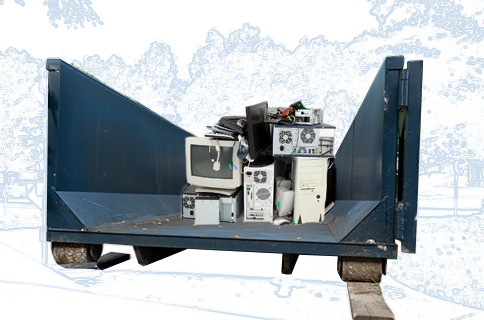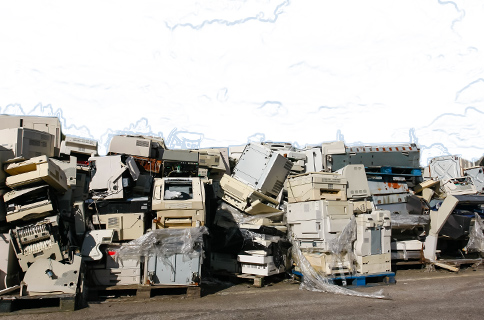
How to Dispose of Electronics

The Complete Electronics Disposal Guide
Getting rid of old electronics like TVs, computers and cellphones can seem tricky, but there are actually several options for disposal. Many outdated electronics are still valuable and can be donated or recycled. If not, there are plenty of other alternatives for throwing them away. Use this guide to learn how to properly dispose of electronics.
What to Do Before Disposing of Electronics
-
Before throwing away electronics, remove all of your personal information. For computers, follow these steps to wipe your hard drive. For cellphones, follow these instructions to delete all personal data.
-
If any of your electronics include rechargeable batteries, remove them before disposal and recycle them separately. Rechargeable batteries contain harmful substances that should not be sent to landfills.

Top 3 Electronics Disposal Options
Wondering what to do with broken electronics? If recycling isn’t an option for your items, there are a few convenient ways to dispose of them. Once you’ve cleared your personal data, choose one of these options to get rid of them safely.
1. Rent a Roll Off Dumpster
A good route for throwing away electronics is to include them as part of a larger home cleanout. Renting a dumpster is an economical way to get rid of everything at once. You can get rid of old electronics, used furniture and broken knickknacks in one quick cleanup and not have to worry about taking them to separate collection sites.

Benefits | Things to Consider |
|---|---|
|
|
|
|
| |
|
2. Check With Your Curbside Collection Service
If you have just a few electronics to get rid of, you may be able to place them in your garbage can or on the curb for collection. However, some cities ban electronics from area landfills due to the hazardous materials they contain. Double-check the rules in your location.
Benefits | Things to Consider |
|---|---|
|
|
|
|
|

3. Find a Local Household Hazardous Waste Facility
If curbside collection isn’t an option in your area and you don’t have enough junk to warrant renting a dumpster, you might be wondering how to properly dispose of your electronics. The best place to drop off electronics is your local household hazardous waste facility where they will be safely disassembled for disposal. Some facilities serve individual cities, while others operate at the county level. Contact your city's public works department or search for a household hazardous waste facility near you.
Benefits | Things to Consider |
|---|---|
|
|
|
|
|

Where to Recycle Your Electronics
If you’re looking for an eco-friendly electronics disposal option, recycling may be a possibility. Recycling old electronics can help conserve the materials they contain while keeping any hazardous substances out of landfills.
Wondering where you can recycle your old electronics? Here are a few options.
1. Find a Take-Back or Trade-In Program
If you are planning to upgrade your electronics, contact the manufacturer or retailer to find out if they offer a discount or trade-in option for returning an older model. Amazon offers a mail-in option, providing gift cards in exchange for cellphones, e-readers, tablets and Bluetooth speakers. Apple also offers credits on new iPhones, iPads, computers and Apple Watches when you trade in a device in good condition.

2. Research Retailer Recycling Programs
Some retailers, including Best Buy, host electronics recycling programs. Call ahead to make sure the location near you is accepting your items and plan to drop them off. Call2Recycle also places drop boxes at retail locations to collect cellphones and rechargeable batteries for recycling. Not sure how to recycle an old computer? HP offers return and recycling options for a wide variety of electronics and hardware.
3. Visit a Local E-Waste Collection Event
Municipalities often host events to help residents get rid of old electronics responsibly. Call your city’s service department to find out if there is an event being held near you. Make sure to ask what types of products are accepted and where to drop off your electronics for recycling.
4. Sell Your Old Electronics
If your electronics are still valuable, you can try to sell them on your own instead of throwing them away. Sites like Craigslist, Facebook Marketplace and eBay let you list your items for others to purchase, so you can easily get rid of your electronics without sending them to a landfill.

Options for Donating Your Old Electronics
Electronics that are in working condition and not significantly outdated can be donated to charity instead of being thrown away. You can donate your old electronics if:
- They are less than five years old.
- They still function reliably.
- They do not require major repairs or replacement parts.
Note that while many charities don’t have the resources to repair damaged devices, some that specialize in electronics may accept items in need of repair.
Consider the following options when looking for ways to donate old electronics.
1. Give Back to Community Organizations
Local schools, libraries, adult education and employment programs often accept used computers and related accessories, while local domestic violence and homeless shelters will occasionally look for cellphones, computers and TVs. If you are getting rid of a functional TV, contact local senior centers or assisted living facilities to see if they are in need of one.
Reach out to your local centers to find out what they need before you drop off any working electronics.

2. Find a National Organization Collecting Electronics
Nonprofits around the country collect used electronics to help them further their missions. From cellphones to computers, use the list below to find a facility that will accept your items.
- Computers with Causes: Simply fill out a form on their website to learn how to donate your computers, tablets and related accessories that are less than three years old. Personal information should be deleted prior to donating.
- Secure the Call: This nonprofit collects out-of-service cellphones that can be used to call 9-1-1 in case of emergency. Any functional cellphone can be submitted to the program via mail once it’s been wiped of personal information.
- Goodwill: In some locations, Goodwill accepts computers, cellphones and various electronic accessories including DVD players and stereos. In most locations, TVs are not accepted. To donate, call your local Goodwill and find out what items they accept.
- Salvation Army: Call your local facility to find out if they are currently accepting computers, cellphones and TVs. Then, you can arrange the drop-off or pickup of your items.
- Vietnam Veterans of America: Contact Vietnam Veterans of America to donate working televisions, excluding CRT, DLP and tube TVs. They also accept computers, DVD players, stereos and more. They will work with you to schedule the pickup of your items.
Always inquire about your local organization's needs and in what condition they accept items.

Frequently Asked Questions About Electronics Disposal
Can I mix electronics with other debris in a dumpster rental?
When you rent a dumpster to dispose of old electronics and other household junk, you can simply toss them in the container with your other items. But note that in some areas there may be restrictions on electronics. Call us at 877-220-6380 to learn more about renting a dumpster for household waste.
Are there any fees associated with disposing of electronics?
In some areas, landfills charge a fee to dispose of electronics. This covers the cost of properly handling the hazardous materials they contain. The fee applies whether you’re using a dumpster rental or your curbside collection service. However, in most areas there is no fee to drop off electronics at a household hazardous waste facility. Just be aware that you may need to provide proof of residency in the city or county that facility serves.
Why are there special regulations for electronics disposal?
Many electronic components contain metals, such as lead and mercury, that are harmful to your health. While there’s no danger under normal circumstances, once electronics are compressed in a landfill those substances can be released into the environment. For this reason, many cities require electronics to be disposed of with the same care as other hazardous substances, such as gasoline and motor oil.
Why are older, bulky TVs hard to get rid of?
TV disposal can be difficult depending on the type of television. While many electronics contain some toxic substances, older CRT TVs can contain 6 pounds or more of lead-filled glass which is hard to recycle and toxic to the environment. When searching for where to get rid of an old TV, make sure you verify that the type of TV you have is accepted.








